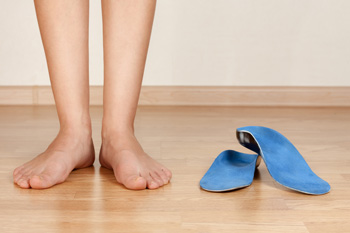If you have plantar fasciitis, an inflammation of the ligament that runs along the bottom of the foot, then you likely deal with foot and heel pain. One way to relieve plantar fasciitis symptoms is to wear orthotics. There are several different types of orthotics used to treat plantar fasciitis. Heel cups or pads are placed in the back of your shoes. They lift up the heel slightly and cushion it, relieving tension in the Achilles tendon and plantar fascia. Shoe insoles are inserted into the shoes and run along the entire sole of the foot. They support the foot arches to reduce strain on the plantar fascia ligament. Night splints are devices that hold the foot in place while you sleep, gently stretching your ligaments and tendons to avoid heel pain in the morning. To find out if orthotics are right for you, please consult with a podiatrist.
If you are having discomfort in your feet and would like to try orthotics, contact one of our podiatrists from New England Foot and Ankle. Our doctors can provide the care you need to keep you pain-free and on your feet.
What Are Orthotics?
Orthotics are inserts you can place into your shoes to help with a variety of foot problems such as flat feet or foot pain. Orthotics provide relief and comfort for minor foot and heel pain but can’t correct serious biomechanical problems in your feet.
Over-the-Counter Inserts
Orthotics come in a wide variety of over-the-counter inserts that are used to treat foot pain, heel pain, and minor problems. For example, arch supports can be inserted into your shoes to help correct overarched or flat feet, while gel insoles are often used because they provide comfort and relief from foot and heel pain by alleviating pressure.
Prescription Orthotics
If over-the-counter inserts don’t work for you or if you have a more severe foot concern, it is possible to have your podiatrist prescribe custom orthotics. These high-quality inserts are designed to treat problems such as abnormal motion, plantar fasciitis, and severe forms of heel pain. They can even be used to help patients suffering from diabetes by treating foot ulcers and painful calluses and are usually molded to your feet individually, which allows them to provide full support and comfort.
If you are experiencing minor to severe foot or heel pain, it’s recommended to speak with your podiatrist about the possibilities of using orthotics. A podiatrist can determine which type of orthotic is right for you and allow you to take the first steps towards being pain-free.
If you have any questions please contact one of our offices located in Chelmsford and Newburyport, MA . We offer the newest diagnostic and treatment technologies for all your foot and ankle needs.

